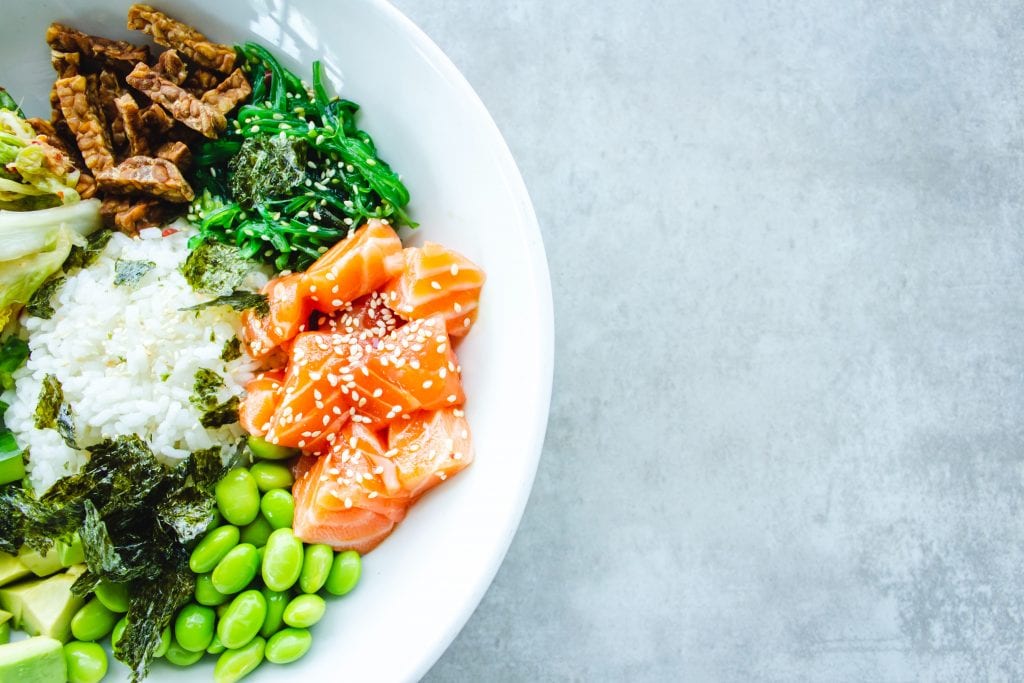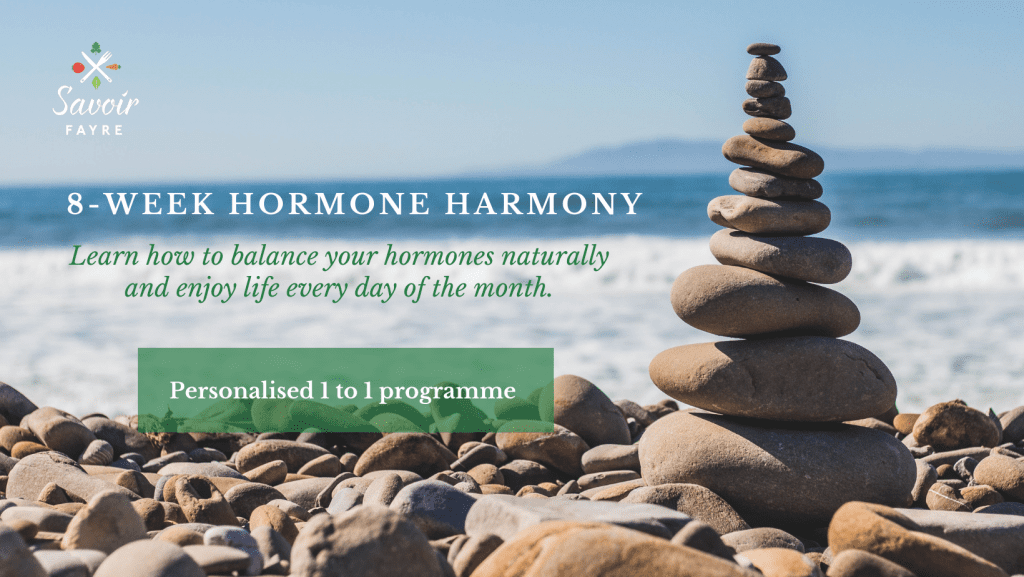
7 foods to eat to reduce pre-period symptoms
You are not alone – 30% of women suffer from PMS pains every month.
Although we have been made to believe that pre-period symptoms are normal, experiencing any kind of pain is a clear sign that something is not quite right. Your body is incredible. It is important for you to pay attention to those signs and take action. It is especially important if you are in your late 30’s or 40’s because these signs could be the start of the Perimenopause. Today, I am sharing 8 foods to include in your diet to help you ease those PMS symptoms so you can enjoy life fully.
Hormones fluctuate every month but feeling pain is NOT normal.
What are typical pre-period symptoms?
As a little reminder, when we talk about pre-period or premenstrual symptoms, you could be experiencing one of 100’s of symptoms including:
- Abdominal cramps
- Nausea
- Irritability/anxiety
- Low mood
- Bloating / IBS symptoms (constipation / diarrohea)
- Breast tenderness
- Food cravings
Why do I get PMS pains?
Women’s hormones fluctuate throughout the cycle especially oestrogen and progesterone. So it is normal for you to experience some changes in the body but experiencing pain is NOT normal. If you find yourself in a situation where you are reaching out for painkillers every single month, you could be causing damage to your liver and other areas of your body. So let’s explore some of the reasons why you could be experiencing discomfort:
- Nutrient deficiencies (you can take a test to find out which one)
- High stress levels
- Thyroid issues
- Poor digestion causing excess oestrogen to recirculate in the body causing havoc
- High toxicity in the body
- Lack of movement
- Excess sugar, salt and caffeine
- The start of the Perimenopause
To get you started on the journey towards a happy cycle, here is a list of everyday foods that can make a difference to your body. During our cycle, the body needs to be flooded with nutrients so that it can produce healthy hormones and it can get rid of unwanted excess hormones.
Foods to eat to reduce Pre-Period symptoms
1. Leafy greens
Vegetables from the cruciferous family such as kale, broccoli, cauliflower and other green leafy vegetables like spinach, rocket and Swiss chard are known to support the body’s detoxification processes. This is particularly helpful if you experience symptoms of oestrogen dominance such as tender breasts, cramps, bloating etc… This is very common at the start of the Perimenopause.
2. Phytoestrogens rich foods
They are found in legumes such as chickpeas, lentils and beans and also in soy beans (organic), tofu, tempeh, flaxseeds, sesame seeds, berries, oats, barley, rice, alfalfa, apples, pomegranates, carrots, sweet potato,
Phytoestrogens help balance oestrogen levels in the body and this is particularly helpful for perimenopausal women. The recommended amount is 2 portions per week.
3. Wholegrains
These include oat, wild or brown rice, quinoa and buckwheat. If you don’t get affected by gluten, you can also enjoy whole wheat and spelt. Wholegrains contain B vitamins which are essential if you feel tired. They also help curb those carb cravings many women experience just before their period starts.
A satisfying snack could be oat crackers with nut butter and slices of pear.
4. Magnesium-rich foods
Magnesium is an incredible mineral that plays a part in more than 300 functions in the body. If you experience any kind of stress, your body is likely to be deficient in magnesium. So if you want to ease cramps just before your period, why not include some of these magnesium-rich foods: Leafy greens like kale, spinach, and rocket, brown rice, banana, unsalted nuts (to avoid water retention), seeds like pumpkin and flaxseeds, avocado and legumes (chickpeas, lentils and beans). And let’s not forget dark chocolate (with a minimum 70% cocoa).
You could also enjoy a bath with Epsom Salt bath. Ok, this is not a food but your body will absorb the magnesium present in the Epsom Salts and you will feel nicely relaxed.
5. Potassium-rich foods
Feeling bloated and experiencing water retention is very common before periods start. You may be aware that eating salty foods can worsen water retention. To counteract this, one thing to try is to consume potassium-rich foods. The main role of potassium in the body is to help maintain normal levels of fluid inside our cells. Sodium, on the other hand, maintains normal fluid levels outside of cells. Since Potassium and Sodium have opposite effects, it is all about achieving the right balance.
You will find Potassium in the following foods: Dried fruits (apricots), beans, lentils, potatoes, butternut squash, broccoli, avocado, bananas, melon, oranges, tomatoes, natural yogurt, almonds, cashews, chicken and salmon.
Foods that are rich in Sodium that should be avoided include bread, cheese, processed meat, and other processed foods.
6. Healthy fats
These are the build blocks of our hormones. Healthy fats are our friends, we shouldn’t be afraid of them. A little every day can help our body produce healthy hormones.
Healthy fats include walnuts, olive oil, avocado, a small amount of organic butter, and oily fish like salmon, sardines, and mackerel.
7. Probiotic-rich foods
Keeping our digestion flowing nicely is essential to avoid bloating during the cycle. Adding a small amount of sauerkraut, kimchi, or kefir into your diet can give your friendly bacteria a little boost and will help you stay regular. Starting slow is important because if you feel bloated when you eat certain foods, this is a sign that your gut is off balance. Adding probiotic-rich foods too quickly could make you feel worse before feeling better.
Discover the “HORMONE HARMONY PROGRAMME” HERE to address hormonal imbalances.
Can I do more to help my body with pre period symptoms?
If you are really keen to reduce your PMS symptoms, let’s not forget the foods that could make your symptoms worse. These include tinned foods (high in salt), sugary foods (except a small amount of chocolate with 70% cocoa), dairy products like milk, caffeine, and alcohol (sorry for the bad news!).
What are my next steps?
If this is not quite enough for you, feel free to get in touch. There are many things you can do to rebalance your hormones. A tailored approach may be beneficial for you including functional testing to give you precise data on what is going on in your body.

This Hormone Harmony Programme is designed to help you learn about your body and how to achieve optimum health for the long term.
Hormone balance (especially for period pains, fertility, and perimenopause) is greatly influenced by diet and lifestyle choices. So there is so much you can do to balance your hormone naturally. Let me help you get started.
“I’ve seen a big improvement to my overall health since our sessions. While my diet was already good, I’m now putting so much more emphasis on whole foods. Addressing my hormonal imbalance with the supplements has also made me feel more balanced and less hungry generally. This also paired with choosing savoury over sweeter snacks has made a big difference.”
– Cat, South London
For more information, feel free to get in touch for a chat. Alternatively, feel free to join my free Facebook community “Hormone Harmony” for regular tips, yummy recipes, and advice on how to balance hormones naturally.
